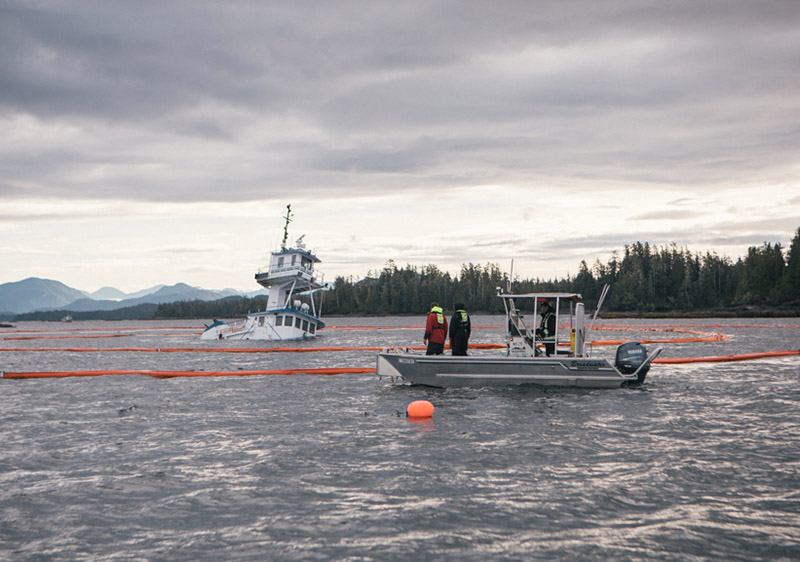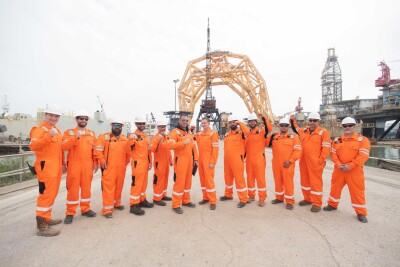Fatigue and sleep deprivation figure in about half of the maritime accidents in the Pacific Northwest and manage to defeat even the most modern wheelhouse technology, experts said at the Pacific Marine Expo in Seattle yesterday.
“There is only one solution to sleep deprivation. It’s eight hours of sleep in 24 hours,” said Jerry Dzugan, director of the Alaska Marine Safety Association.
U.S. and Canadian investigators found lack of sleep was a central factor in the October 2016 grounding of the Kirby Offshore Marine tug Nathan E. Stewart in the Inside Passage of British Columbia.

Jerry Dzugan, director of the Alaska Marine Safety Education Association. Kirk Moore photo.
The National Transportation Safety Board and Transportation Safety Board of Canada found the second mate dozed off and missed a course change before the 95’4″x32’x12’, 3,400-hp Nathan E. Stewart and its 287’6″x77’8″x8’ double-hulled barge ran aground just before 1 a.m.
Over the preceding three days, the mate had slept between 4.5 hours and 6.5 hours on mornings, but not during his off-watches after noon, the agencies reported. The Canadian board put much blame on the six hours on, six hours off watch system widely used in the towing industry, which they said does not allow enough time for crew rest.
The NTSB report called for watch alarms in towing vessels, that helmsmen must reset at intervals or an alarms sounds to alert other crew members.
In the Northwest fishing industry, fatigue and sleep deprivation is a common factor in vessel casualties, said Mike Lynch of the Washington state Department of Ecology spill investigation and response unit.
A former ferry pilot and research vessel captain, Lynch recalled his days on the six-on, six-off watch system and the worry of “nodding off the in the wheelhouse.”
“So I know from first-hand experience in our business that fatigue is a big problem,” he said.
The film is just one in a series of stories about deeply experienced captains undone by fatigue, their perceptions and reactions dulled, and sophisticated vessels run up on jetties and rocks.

The Titan, a newly refitted Northwest crab boat, was a total loss of $1.8 million after her captain dozed and the vessel grounded on an Oregon jetty in December 2014. HD Fisheries photo via NTSB.
“This was a well-appointed vessel: dual GPS, autopilot, a watch alarm which was not functioning,” said Lynch. “Weather was good, clear, west wind, slight swell, yet there they were.” The vessel was a total loss at $1.8 million.
Two months later, the 82’ pot fishing boat Savannah Ray grounded at Long Island, Alaska, and sank. Like the Titan, the Savannah Ray had redundant instruments on the bridge and a watch alarm, yet the captain dozed off for another total loss at $800,000.
NTSB investigators reported the Savannah Ray’s crew got no more than 4.5 hours of sleep daily, while the captain told them he slept “a little less.”
The watch alarm had been set for 60 minutes, but the captain drifted into inattention about 15 minutes before it would have sounded. In a January 2017 advisory Coast Guard officials recommended setting watch alarms for 15-minute intervals.
Dzugan said the effects of sleep deprivation are so severe that it is recognized as a form of torture under international law: “In four or five days, you’ll get them talking.”
But mariners, like most people, tend to dismiss the hazards of not getting enough sleep, he said.
“One excuse I hear is, ‘I’ll catch up on my sleep,’” said Dzugan. But sleep deficits persist until they can be treated with a solid eight hours, he said.
Chronic sleep deprivation erodes work skills, alertness, concentration and reaction time, and can heighten tendency toward risk-taking, said Dzugan. Over time there are health effects, including obesity — brought on by snacking during times of stressed and fatigued work — and anxiety and depression.
While a solid eight hours of sleep is healthy, taking any sleep when it can be gotten helps, Lynch and Dzugan said.
“Doing this eight-hour stretch is a construction because we have electricity” to extend work into the evening hours, said Dzugan. “For most of this time on Earth we’ve been four and four,” a natural resting rhythm in traditional societies with afternoon siestas, he said.
The six-on, six-off watch system has come in for renewed scrutiny with the advent of Subchapter M safety regulations for towing vessels.
Of his days on the watch system, Lynch says, “I would have qualified for a zombie movie. It’s very tough to get the full six hours (of rest).”
The six-by-six watch system “is not real life,” said Dzugan. “When you come into a harbor with a fuel barge, it’s all hands on deck.” Circumstances vary, and in fact there is “no perfect watch cycle,” he said.




.png.small.400x400.png)
